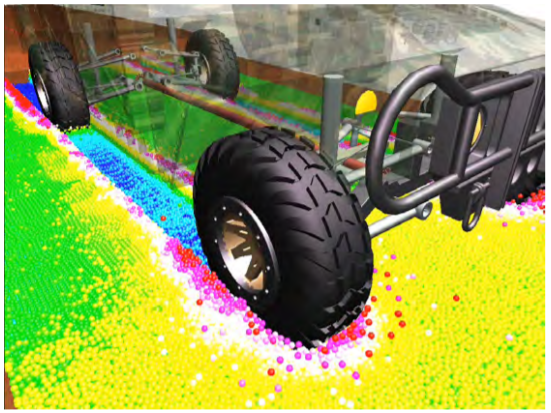Vehicle Controls & Behaviors
Annual PlanFast Numerical Algorithms for High-Fidelity Simulation of Terramechanics
Project Team
Government
Paramsothy Jayakumar, David Gorsich, U.S. Army GVSC
Industry
Tamer Wasfy, Advanced Science and Automation Corporation
Student
Saibal De, Eduardo Corona (post-doc, research associate), University of Michigan
Project Summary
Project began in September 2016 and was completed in 2019.

High-fidelity simulations of soil mechanics and wheel-soil interactions is crucial to the success of integrated simulation environments for unmanned ground vehicles (UGVs) in off-road settings. Direct numerical simulations have received significant attention in the recent past as they mitigate the need for extensive experimentation, or offer predictive capabilities when experiments cannot be performed. However, physics-based high-fidelity simulations are extremely challenging owing to the multi-scale, multi-physics nature of these problems. Innovations in algorithms and the rapid progress in hardware are now enabling faster solves and several research groups have demonstrated grain-to-vehicle level simulations.
Terrain typically is modeled as a granular media i.e., as a collection of particles of arbitrary shape; each responding to body forces such as gravity, inertia or drag, as well as repulsive or dissipative forces caused by contact. The discrete element method (DEM), also known as Nonsmooth Rigid Multibody Dynamics (NRMD), is one of the most widely used approaches to simulate the dynamics of granular materials. Distinct instances of the DEM are defined essentially by their modeling of contact forces, and thus in how collisions are handled.
Our aim in this project was the development of numerical solvers to increase the efficiency and robustness of this approach, focusing on the acceleration of rapidly convergent second order methods. We have adapted Tensor Train (TT) hierarchical factorization techniques to the complementarity problem, producing robust, easy to update direct solvers and preconditioners for PDIP methods. We have tested their performance in a series of DEM validation experiments, demonstrating significant speed ups and favorable scaling of computational costs for a serial implementation of our solvers.
Our focus was thus to design efficient distributed memory (MPI) parallel implementations of our accelerated solvers. Given the lack of available distributed memory software for DEM-C frictional contact simulation, we have developed our own MPI implementation of DEM-C frictional contact for the cone complementarity problem (CCP), featuring parallel implementations of first and second order optimization solvers such as BBPGD, APGD, PDIP and SCIP. We have then developed MPI implementations of the Tensor-Train decomposition in order to implement parallel accelerated PDIP and SCIP methods, and compare these to state-of-the-art codes. Ultimately, our goal in our ongoing work is to apply these methods to the solution of large-scale terramechanics problems, where we believe they will have a transformative impact. Further, we believe the development of massively parallel Tensor Train solvers can potentially lead to their wide application in large-scale physics simulation, data compression and multi-fidelity modeling.
Publications:
- Corona, E., Gorsich, D., Jayakumar, P., and Veerapaneni, S. (September 19, 2019). “Tensor Train Accelerated Solvers for Nonsmooth Rigid Body Dynamics.” ASME. Appl. Mech. Rev. September 2019; 71(5): 050804. https://doi.org/10.1115/1.4043324
- S. De, E. Corona, P. Jayakumar and S. Veerapaneni, “Scalable Solvers for Cone Complementarity Problems in Frictional Multibody Dynamics,” 2019 IEEE High Performance Extreme Computing Conference (HPEC), 2019, pp. 1-7, doi: 10.1109/HPEC.2019.8916234
#1.22
Publications:
Corona, E., Gorsich, D., Jayakumar, P., and Veerapaneni, S. (September 19, 2019). “Tensor Train Accelerated Solvers for Nonsmooth Rigid Body Dynamics.” ASME. Appl. Mech. Rev. September 2019; 71(5): 050804.
Corona, E., Gorsich, D., Jayakumar, P., & Veerapaneni, S. (2019). Tensor train accelerated solvers for nonsmooth rigid body dynamics. Applied Mechanics Reviews, 71(5), 050804.
S. De, E. Corona, P. Jayakumar and S. Veerapaneni, “Scalable Solvers for Cone Complementarity Problems in Frictional Multibody Dynamics,” 2019 IEEE High Performance Extreme Computing Conference (HPEC), Waltham, MA, USA, 2019, pp. 1-7, doi: 10.1109/HPEC.2019.8916234.

